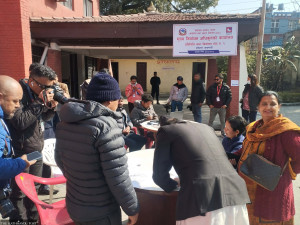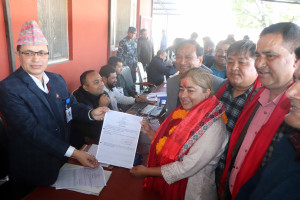National
WhatsApp group helps mental health patients
Health ministry to send psychiatrists to 14 district hospitals every month.
Arjun Poudel
Ganesh Rai, a public health inspector at Bhojpur’s Tyamkemaiyum Rural Municipality-7, had been seeing his neighbour who has been suffering from bipolar disorder, a serious mental health condition, for years. But Rai came to realise the severity of his neighbour’s problem only a few months ago after he took a week-long mental health training and connected to a WhatsApp group of health workers, including psychiatrists and psychologists.
Rai shot a 90-second video of his ailing neighbour and shared it on the WhatsApp group. “The group members diagnosed the problem as bipolar disorder and prescribed him medication,” Rai told the Post over the phone from Bhojpur. “Now the patient’s health has markedly improved.”
Bipolar disorder is a mental health condition that causes extreme mood swings, including emotional highs, also called mania or hypomania, and lows or depression.
Nepal is among the countries with highest rate of suicide, which is an extreme manifestation of a mental health problem. A study carried out by the Nepal Health Research Council shows that about 13 percent of Nepalis suffer from some form of mental disorder. This means around one in eight Nepalis have mental health issues.
As people struggle to manage even the most basic of needs, including food, housing, health care, and job security, among others, an increasing number of them are facing mental problems, experts say.
Moreover, the country simply does not have enough experts to treat and cure mental health problems, they say. The prospect of hiring mental health experts for district hospitals in the near future is slim, as the whole country has a shortage of such experts, said Dr Phanindra Baral, chief of the mental health section at the Epidemiology and Disease Control Division.
It is estimated that of around 160 psychiatrists in the country—most of whom are based in urban areas—fewer than 40 work at state-run hospitals.
“To compensate for this shortage, we have provided mental health screening training to hundreds of health workers,” Baral said. “It has been yielding positive results.”
Rai is one of dozens of health workers who got mental health training and are connected to the WhatsApp group of psychiatrists and psychologists.
And his neighbour is among the six patients in his village who have been suffering from serious mental health problems for years and were deprived of treatment due to lack of trained health workers in the nearby health facility.
Currently, the said patient and other five are on regular medication and their health conditions are improving with the help of experts connected to the WhatsApp group.
“His family had tied him [the patient] with a chain and locked him in a room,” said Rai. “After the start of medications, we have noticed a lot of changes in his behaviour and his family has released him from the chain and room.”
Officials said that use of WhatsApp and Viber groups has helped health workers to communicate with experts, understand problems and prescribe proper medications.
“Many mental health problems have been diagnosed and treated on time with the help of social media apps,” Baral said. “Along with health workers and experts, we officials from the Health Ministry are also connected to Viber and WhatsApp groups.”
Meanwhile, the Ministry of Health and Population said that it has been working to send psychiatrists to 14 district hospitals of seven provinces for a few days every month to treat mental health patients.
Those doctors will check the health condition of such patients and provide mental health screening training to health workers serving in the districts, according to Baral.




 16.12°C Kathmandu
16.12°C Kathmandu















